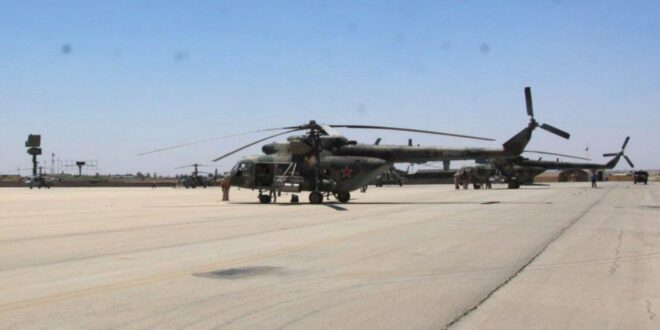Enab Baladi says Russia exaggerates the number of soldiers it keeps in Syria.
Speculation has swept over the past few weeks about the number of Russian soldiers present in Syria, in light of reports that Russia has reduced that number, according to what was reported by Russian media that does not reflect the official vision in Moscow.
The Moscow Times on May 7th said Russia had begun withdrawing its military forces from Syria and is concentrating them at three airports before being transferred to the Ukrainian front.
The abandoned airbases of the Russian Federation are transferred to the Iranian military-political formation of the Islamic Revolutionary Guard Corps (IRGC) and the Lebanese Hezbollah, the news site added.
According to the Ministry of Defense, in 2015-18, 63,000 military personnel were stationed in the country, of which almost half were officers, according to The Moscow Times.
Given the course of the Russian war on Ukraine, which has crossed its 100th day, the Russian military operations have reduced ambitions to reach Kyiv, and this appeared through the return of diplomatic delegations and offices of some countries to resume their activities in the Ukrainian capital, and Moscow admitted through the Ministry of Defense the killing of 1,351 Russian soldiers in Ukraine in its latest statistics issued on March 25th.
The losses declared by Russia contradict what was published by the Russian newspaper Komsomolskaya Pravda, which publishes pro-Kremlin news reports and reported during the same period that 9,861 Russian soldiers were killed and 16,153 others were wounded.
The previous two figures and other figures issued by British Intelligence increased the number by a few thousand to reach half of what the Ukrainian President, Volodymyr Zelenskyy, is talking about regarding Russian casualties. These figures do not reflect an urgent need to bring in additional forces for the slow battle in Ukraine, especially with a Russian mobilization of up to 190,000 soldiers, according to what the BBC reported on March 19th.
How many?
In an interview with Enab Baladi, Raed Jabr, an expert on Russian affairs, questioned the accuracy of the figures that speak of the presence of 63,000 Russian soldiers in Syria, considering that the number is inaccurate and exaggerated, given that Moscow is concealing the numbers, movements, and losses of its military forces, in line with Russian military doctrine.
Jabr explained that the absence of civil society and a free press in Russia hinders the possibility of reaching accurate numbers at the military level. He also indicated that the mentioned number (60,000) or any numbers that can be put forward are not limited to the Russian army forces fighting in Syria only. There are other groups, including the military forces located at the Hemeimeem base. Many of these forces have non-combat missions, and their presence is linked to monitoring and follow-up operations in the Mediterranean.
There are naval and ground forces in Tartous, part of which performs other non-combat missions, in addition to the presence of the military police, which conduct patrols in different areas and whose efforts are different in Syria, despite the possibility of engaging in battles. There are also many experts and consultants in Syria to ensure communication and planning with the leadership of the Syrian regime in different regions.
On May 26th, Russian Foreign Minister Sergey Lavrov announced that his country’s forces had almost no combat missions left in Syria, pointing out that their number “on the ground” is determined by specific tasks and based on “the principle of interest,” according to what was stated during an interview with the Russian Arabic-speaking channel RT.
Jabr believes that even the forces present today in Syria are not fully used, and the reduction does not conflict with the Russian forces strengthening some of their points in Syria, and they are part of the active forces in Syria whose combat missions will not be dispensed with, without any reduction in the future.
 Eurasia Press & News
Eurasia Press & News




